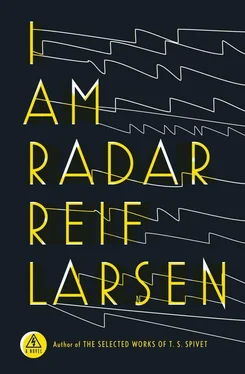“Ahoy! We’re leaving!” Lars shouted from the filling station.
Horeb clapped his hands and said something to the children. They came crowding around Radar, touching him, hugging him.
“Mundele ndom, mundele ndom,” they cried.
“What does that mean?” Radar asked.
“It means ‘the white black man.’”
“Is that good?”
“You tell me.” Horeb laughed.
It was early evening by the time they reached Kinshasa, though Radar never saw the great city, for they did not stop. He only heard the shouts and the sounds of traffic, the crowds, the cries of anger, the brief caress of laughter, bursts of music from open windows, and the endless chorus of honking. At some point they heard the telltale screech and crash of an accident, followed by screams. For Radar, it was completely and solely an aural city. A city of the imagination.
“It’s easy to forget your soul in Kinshasa,” said Horeb as they passed through. “I was there to study. I made my brain larger, but sometimes I didn’t remember my heart.”
“What did you study?”
“Linguistics. International relations. Religious studies. I wanted to be a translator and interpreter for the UN. But I couldn’t focus on my work. I was going in too many directions. I lost my way. So I ended up leaving after two years.” He looked down. “You must think I’m stupid to throw away an opportunity like that.”
“I don’t think you’re stupid,” said Radar.
“I’ve never been able to finish what I start. It’s my curse. I always try to remind myself that when Muhammad started preaching, no one believed him — no one but his wife. Nothing came easy for him. He had to earn it. . with patience. With patience and wisdom and belief.”
They listened to the mutter of a moto approaching and passing their truck.
“When people live too close together, you see the best and worst side of them,” said Horeb. “You step over human waste in the street, but you are also given food by strangers. You see people robbed by guns, but you also see young men helping old women carry their bags. Sometimes you see the good and evil in the same afternoon. Everyone understands how difficult it is to live like this. It can make you hard, like a nut, but it also leaves you open for hope, for the words of a prophet — whether this is Jesus, Muhammad, or even”—he gave a little laugh—“one of our presidential candidates. Every nut has a soft inside.”
“Is that true? I feel like I’ve met nuts with no insides.”
Horeb smiled. “We need a great leader. We need a young Nelson Mandela in Congo, who can bring the people together. This country has so much. It can be the most prosperous country in all of Africa. It can be a symbol of cooperation. But this leader must not lead because he is seduced by power. He must lead because his only option is to lead, because the world demands him to lead.”
“Maybe this leader is a she ,” said Lars without looking up from his work. It was the first thing he had said since giving Horeb the tracksuit. Radar realized he had been listening the entire time, and that what had passed between him and Horeb had in fact passed between them all.
• • •
THEIR DESTINATION was a small fishing port called Mikala. The truck rumbled down a dirt track, and when they finally stopped and the doors to Moby-Dikt were thrown open, they saw that they were once again on the banks of the great river, though 450 kilometers upstream. The same river but never the same river. The water still as glass and at least three kilometers wide.
Lashed to the docks were perhaps thirty small barges, all in varying states of rust and decay. The beach nearby was covered with small fishermen’s pirogues — canoes dug out from tree trunks. The fishermen had splayed their nets across the beach to dry. A single, ancient gantry crane rose above the docks.
As soon as they jumped down from the container, they were immediately surrounded by a crowd. People were pushing and jostling one another to get close, but not too close. Radar noticed that, unlike the scene that morning in front of the Hôtel Metropole, no one was trying to sell them anything. Instead, everyone was staring at Professor Funes, who stood beneath his parasol a short distance away, talking to his driver.
Indeed, as Radar watched, the crowd began to shift toward Funes. The driver immediately brandished a club and blew on a whistle. The crowd halted. The driver started to speak, waving the club above his head. Radar noticed that almost everyone in the crowd was holding a small package. Then a young man broke from the crowd and extended his package to Funes with one hand, his other hand holding the elbow of the outstretched arm. A hush fell over everyone. Radar thought the driver might hit the man with his club, but Funes stepped forward, folded up his parasol, and took the package. He lifted it to his forehead and made a little bow. Funes said a few words to the man in the man’s language. The man clasped his hands together and bowed back, beaming. The crowd held its breath and then, with an exclamation, everyone began to push forward. The driver blew his whistle, but no one was listening anymore. Another man held out his package, and again Funes repeated the ritual of receiving the gift and touching the package to his forehead. Packages were being extended from all directions. Funes calmly took each one, repeating his gesture of thanks. The crowd now stretched back off the docks and up into the village. More were coming down from the hills. Everyone was carrying a package.
“What’s going on?” Radar asked.
“I haven’t the faintest idea,” said Lars.
“He’s the Tatayababuku,” Horeb said quietly, without taking his eyes from Funes.
“The what ?”
“The father of books. The Tatayababuku is a sorcerer who knows all things. They think his books give him power. So they give him gifts for his library. They think he will protect them.”
“Those are books ?” said Radar. “How do you know all this?”
“Everyone knows about the Tatayababuku. His magic is powerful.”
“Why didn’t you tell us this?” said Otik, a note of suspicion in his voice.
“Better to see for yourself,” Horeb said with a smile.
They watched as Professor Funes received the books. Each book was wrapped in newspaper or brown wrapping paper. More and more people came down to the waterside, and the pile beside him began to grow. The driver managed to keep the crowd mostly at bay, until one woman threw herself at Funes’s feet. She was sobbing. In her arms she was holding a small child, whom she offered up to Funes. The crowd immediately grew uneasy.
“Her child is sick,” said Horeb. “She’s asking him to heal the child.”
For the first time, Funes looked uncomfortable. He cautiously touched the child’s head and then murmured to the mother. She was led away, weeping but smiling.
“They don’t actually believe the books are magic, do they?” said Radar. “How can they?”
Horeb pointed at the crowd. “They must believe in something. I think Americans believe in much stranger things, yes? Guns? Plastic surgery?”
“That might be true,” said Radar. “But who told them this? Who told them the books were magic? Did he say this? Who started giving him books?”
“How does anything begin?” said Horeb. “Did Islam begin with Muhammad’s first revelation or when his wife became his first believer? You should ask the Tatayababuku about who started this.”
The sun began to set over the river. The water turned gold and red and then silver, forming a perfect mirror to the sky.
When there were no more books to be given, Funes raised his right hand above his head and silenced the throng. He produced a small book from his pocket. After a moment’s pause, he began to read in his curious high-pitched voice. A poem in French.
Читать дальше












